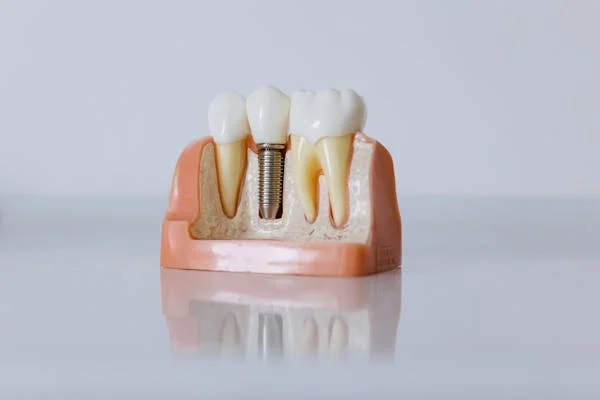
Dental crowns are a popular choice for restoring damaged or weakened front teeth, providing both functional and aesthetic benefits. Whether you’ve recently had a crown placed or are considering it, it’s essential to understand how to make sure your crowns last as long as possible. In this article, we will explore various strategies to prolong the lifespan of your front teeth crowns, keeping them intact, effective, and beautiful for years to come.
Understanding Dental Crowns
Dental crowns are tooth-shaped caps placed over a damaged or decayed tooth. They can be made from different materials, such as porcelain, metal alloys, or a combination of both. Crowns provide strength to the affected tooth, improve its appearance, and restore its functionality. Front teeth crowns, often made of porcelain or ceramic, offer a natural look while maintaining durability.
Proper Oral Hygiene
To extend the life of your dental crowns, maintaining excellent oral hygiene is non-negotiable. While crowns are durable, they are still susceptible to plaque buildup, which can lead to gum disease and tooth decay. Follow these essential oral care tips:
- Brush twice a day: Use a soft-bristled toothbrush and fluoride toothpaste to brush your teeth, including around the crown. Be gentle around the crown to avoid loosening it.
- Floss daily: Flossing helps remove food particles and plaque from between your teeth and along the gumline, areas where a toothbrush may miss.
- Use an antibacterial mouthwash: This helps reduce plaque buildup and prevents gum infections that can affect your crowns.
Avoid Hard and Sticky Foods
One of the most effective ways to ensure the longevity of your front teeth crowns is to avoid eating foods that can place excessive strain on them. Crowns are strong but are not indestructible. Eating certain foods can cause the crown to crack, chip, or loosen.
- Avoid hard foods: Hard candies, ice, or nuts can damage your crowns or even break them. Chewing on these foods places extra pressure on the crown, leading to fractures or wear.
- Limit sticky foods: Caramel, chewing gum, or taffy can get stuck in the grooves of your crown and may pull it off or loosen it over time. Sticky substances can also contribute to plaque buildup around the base of the crown.
Wear a Mouthguard for Protection
If you engage in sports or have a habit of grinding your teeth (bruxism), it is crucial to wear a custom-fitted mouthguard. Bruxism can put significant pressure on your dental crowns, leading to cracks or premature wear. A mouthguard acts as a buffer, absorbing the force from grinding or clenching, protecting both your natural teeth and crowns.
Additionally, for those who grind their teeth during sleep, wearing a night guard can prevent the abrasive action of teeth grinding from damaging crowns. A dentist can create a custom-fitted guard to ensure optimal protection.
Regular Dental Check-ups and Professional Cleanings
Maintaining a schedule of regular dental visits is crucial to the health of your crowns. A professional dentist can evaluate the condition of your crowns, check for any signs of wear or damage, and ensure that the fit is still optimal. Regular cleanings also help keep the surrounding gums and teeth healthy, which directly impacts the lifespan of your crowns.
- Routine exams: Your dentist can detect any potential issues early, such as crown loosening or decay beneath the crown, allowing for timely intervention.
- Professional cleanings: A dental hygienist can remove stubborn plaque and tartar buildup that may be difficult to address with at-home care. Cleanings also ensure that your crowns stay free from staining and discoloration.
Addressing Gum Health for Longer-Lasting Crowns
The health of the gums surrounding your crowns plays a significant role in their longevity. If your gums are unhealthy, it can affect the stability of the crown and lead to complications. Maintaining strong gum health should be a priority to ensure that your crowns stay in place and function properly.
- Avoid smoking: Smoking not only affects your oral health but also contributes to gum disease, which can compromise the strength and position of your crowns.
- Use a gum health-boosting mouthwash: Special mouthwashes formulated to promote gum health can help reduce inflammation and prevent gum disease, ensuring your crowns stay securely in place.
- Address gum recession: If you notice that your gums are receding around your crown, consult your dentist. Gum recession can expose the edges of the crown, making it more prone to damage.
Watch for Signs of Crown Damage
Even with the best care, crowns may show signs of wear or damage over time. It’s important to monitor your crowns and seek professional assistance if you notice any of the following:
- Loosening: If your crown feels loose or wobbly, don’t delay in scheduling a visit to your dentist. Loose crowns can allow bacteria to enter and cause decay in the underlying tooth.
- Discoloration: If your crown begins to discolor, it may be a sign of staining, especially if it’s made from porcelain. Professional cleaning or a replacement may be necessary.
- Cracks or Chips: Small chips or cracks can lead to bigger problems. If your crown is compromised, it may need to be repaired or replaced to avoid further damage.
Consider Crown Replacement When Necessary
Although dental crowns are durable, they are not meant to last forever. Over time, wear and tear or changes in your dental health may require you to replace your crown. If your crown has reached the end of its lifespan, your dentist will recommend a replacement to avoid issues like tooth decay, infection, or discomfort.
If you notice any noticeable damage or discomfort with your crown, consult your dentist promptly. Crowns may need to be replaced due to decay under the crown, severe staining, or functional issues. Your dentist will help you determine the best course of action to maintain both the aesthetics and function of your front teeth.
Conclusion
The longevity of crowns on front teeth is largely dependent on a combination of proper oral care, avoiding harmful habits, and regular dental check-ups. By following these practical tips, you can help ensure that your crowns last as long as possible, providing both a beautiful and functional smile. It’s essential to protect your investment in dental restoration by maintaining good hygiene, avoiding damaging foods, and seeking professional advice when necessary. With the right precautions, your crowns will continue to enhance the appearance of your smile and protect your teeth for years to come.
Contact your dentist today to discuss how you can protect your crowns and improve your oral health!
